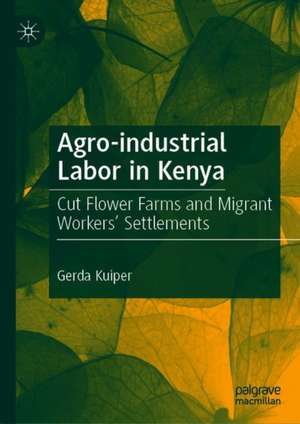Agro-industrial Labour in Kenya: Cut Flower Farms and Migrant Workers’ Settlements
Autor Gerda Kuiperen Limba Engleză Hardback – 31 mai 2019
| Toate formatele și edițiile | Preț | Express |
|---|---|---|
| Paperback (1) | 452.25 lei 6-8 săpt. | |
| Springer International Publishing – 15 aug 2020 | 452.25 lei 6-8 săpt. | |
| Hardback (1) | 591.96 lei 6-8 săpt. | |
| Springer International Publishing – 31 mai 2019 | 591.96 lei 6-8 săpt. |
Preț: 591.96 lei
Preț vechi: 696.42 lei
-15% Nou
Puncte Express: 888
Preț estimativ în valută:
113.27€ • 118.56$ • 94.28£
113.27€ • 118.56$ • 94.28£
Carte tipărită la comandă
Livrare economică 31 martie-14 aprilie
Preluare comenzi: 021 569.72.76
Specificații
ISBN-13: 9783030180454
ISBN-10: 303018045X
Pagini: 298
Ilustrații: XV, 284 p. 18 illus. in color.
Dimensiuni: 148 x 210 mm
Greutate: 0.64 kg
Ediția:1st ed. 2019
Editura: Springer International Publishing
Colecția Palgrave Macmillan
Locul publicării:Cham, Switzerland
ISBN-10: 303018045X
Pagini: 298
Ilustrații: XV, 284 p. 18 illus. in color.
Dimensiuni: 148 x 210 mm
Greutate: 0.64 kg
Ediția:1st ed. 2019
Editura: Springer International Publishing
Colecția Palgrave Macmillan
Locul publicării:Cham, Switzerland
Cuprins
1. Introduction.- 2. Naivasha’s History: From Livestock to Flowers.- 3. Coming to Naivasha: Finding a Place to Stay and a Place to Work.- 4. Inside the Farms: Rhythms and Hierarchies.- 5. Workers’ Settlements: In Search of Order.- 6. Building a Future: Preparing to Go ‘Home’.- 7. Conclusion.
Notă biografică
Gerda Kuiper, Ph.D., is a cultural anthropologist with a regional focus on Eastern Africa, a thematic focus on economic anthropology and globalization, and a strong interdisciplinary commitment.
Textul de pe ultima copertă
‘Gerda Kuiper has done a great service to anthropology and African studies by writing a book on the important but understudied global flower industry of Naivasha, Kenya. This will be a valued resource for courses in African studies, economic anthropology, and development studies.’
—Peter D. Little, Samuel Candler Dobbs Professor of Anthropology and Director of Global Development Studies, Emory University, USA
‘In this rich and detailed ethnography, Kuiper seeks to situate labor in the cut flower industry within a wider social and historical field in which the environment, gender, colonialism, and broader political economic factors all come to matter.’
—Sarah Besky, Assistant Professor of Anthropology and International and Public Affairs, Brown University, USA ‘Kuiper has provided us with a superbly crafted ethnography of the migrant farm workers whose labour the flower farms of Naivasha depend upon. This is a classic of its genre, and a timely reminder ofboth the resilience and fragility of Kenya's labour market.’
—David M. Anderson, Professor of African History, University of Warwick, UK
This ethnography analyses labour relations within the export-oriented cut flower industry at Lake Naivasha in Kenya. Though this agro-industry has attracted critical attention from journalists and non-governmental organizations, this book is the first comprehensive, social scientific analysis of the industry’s labour arrangements and production processes. Gerda Kuiper here interprets the work on the farms as ‘agro-industrial labour’: a labour system characterized by high levels of discipline and a strict rhythm of work, due to the demands posed by a highly perishable agricultural product. This framework enables the author to draw on insights from a wide range of anthropological and sociological studies on (agro-)industrial wage labour around the globe. This mixed-methods approach, deployed alongside rich ethnographic detail, allows the author to center the flower farm workers in her analysis.
Gerda Kuiper, Ph.D., is a cultural anthropologist with a regional focus on Eastern Africa, a thematic focus on economic anthropology and globalization, and a strong interdisciplinary commitment
—Peter D. Little, Samuel Candler Dobbs Professor of Anthropology and Director of Global Development Studies, Emory University, USA
‘In this rich and detailed ethnography, Kuiper seeks to situate labor in the cut flower industry within a wider social and historical field in which the environment, gender, colonialism, and broader political economic factors all come to matter.’
—Sarah Besky, Assistant Professor of Anthropology and International and Public Affairs, Brown University, USA ‘Kuiper has provided us with a superbly crafted ethnography of the migrant farm workers whose labour the flower farms of Naivasha depend upon. This is a classic of its genre, and a timely reminder ofboth the resilience and fragility of Kenya's labour market.’
—David M. Anderson, Professor of African History, University of Warwick, UK
This ethnography analyses labour relations within the export-oriented cut flower industry at Lake Naivasha in Kenya. Though this agro-industry has attracted critical attention from journalists and non-governmental organizations, this book is the first comprehensive, social scientific analysis of the industry’s labour arrangements and production processes. Gerda Kuiper here interprets the work on the farms as ‘agro-industrial labour’: a labour system characterized by high levels of discipline and a strict rhythm of work, due to the demands posed by a highly perishable agricultural product. This framework enables the author to draw on insights from a wide range of anthropological and sociological studies on (agro-)industrial wage labour around the globe. This mixed-methods approach, deployed alongside rich ethnographic detail, allows the author to center the flower farm workers in her analysis.
Gerda Kuiper, Ph.D., is a cultural anthropologist with a regional focus on Eastern Africa, a thematic focus on economic anthropology and globalization, and a strong interdisciplinary commitment
Caracteristici
Provides one of the first detailed studies of a labor-intensive agricultural farm on the African continent Connects agro-industrial labor questions to conversations in gender studies, social networks, and translocality Contributes to an on-going public debate on labor conditions on Naivasha flower farms, which together employ tens of thousands of workers
